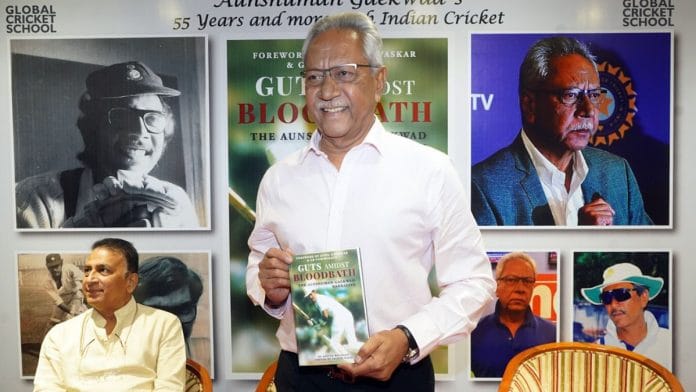The cricket pitch at Sabina Park in Kingston, Jamaica was a battlefield. The year was 1976. West Indies fast bowler Michael Holding sent a bouncer that struck a helmetless Aunshuman Gaekwad on his ear. Blood pooled on the pitch, teammates watched in agony and yet the dazed batsman was not ready to leave the game. He scored 81 runs before leaving the field. It was an innings that came to symbolise his career—not flashy, but fiercely unyielding.
“It was a vicious sight, his blood on the pitch. But Gaekwad didn’t take it to heart,” author and journalist Vijay Lokapally told ThePrint. This was a time when cricket was played without helmets. “In fact, after that incident, he and Holding became really close friends. That defines his attitude.”
Reliable, resilient and resolute, Gaekwad played 40 Tests and 15 ODIs between 1975 and 1987, and had two stints as the Indian team’s cricket coach. His closest cricketer friends were Moinder Amarnath and Kapil Dev. In his obituary on the batsman for Sportstar, Lokapally wrote that Gaekwad adored Sunil Gavaskar and GR Vishwanath, doted on Mohammad Azharuddin and Sachin Tendulkar and remained in awe of his first Test captain Mansoor Ali Pataudi.
“Aunshuman, as a player, was extremely dynamic. But it was as a coach and selector where he truly flourished and shone,” said former cricketer Kirti Azad.
Also read: Babasaheb Purandare was devoted to Shivaji. Politics and critics did not deter him
Impact on Indian cricket
Aunshuman Gaekwad was known for his calm temperament even in the most pitched battles. Cricket was in his DNA. His father, Datta Gaekwad, played 11 test matches in the 1950s.
A young Gaekwad earned his stripes while playing for Baroda and the West Zone before making his debut in the Indian national cricket team in the third Test at Calcutta against the West Indies in 1974. Pataudi was the captain.
Gaekwad presented himself to the captain as instructed. He rang Pataudi’s doorbell and asked him what she should do. But the captain told him to find out for himself.
“As Gaekwad discovered, it was a prank by Pataudi, who wanted the young cricketer from Baroda to back himself,” wrote Lokapally. In his obituary, Lokapally wrote about the relationship between the two sportsmen and the “immense respect” Gaekwad had for his captain. When Pataudi died, Gaekwad took an early morning flight to make it in time for the final rites.
His domestic career was impressive, with over 12,000 runs scored in 205 first-class games over 22 years.
After hanging up his boots, Gaekwad’s impact on Indian cricket grew stronger. He led the Indian team as head coach between 1997 and 2000, a time when the squad was navigating key transitions. He was managing emerging talent and coping with off‑field pressures. His calm, steady presence and emphasis on discipline helped stabilise the team during those crucial years. Later, he shaped future generations further by serving as a national selector and holding a key role in the Indian Cricketers’ Association. In 2018, the BCCI recognised his service with the prestigious CK Nayudu Lifetime Achievement Award.
The 1983 World Cup‑winning champion Kirti Azad recalled that in the early 1980s, when Indian cricket was still fighting for recognition and the team was far from its best, players often faced immense scrutiny and turmoil. “He was a cricketer who could absorb the nastiest blows and still hold the line, who brought the same resilience whether facing brutal pace in Kingston or the pressure of leading a team in transition,” he said.
Also read: Mangala Narlikar changed how girls in India learn math. She took the fear out of it
More than a cricketer
Beyond the numbers and roles, Gaekwad was remembered for his humanity. Teammates described him as a “mood‑uplifter,” a friendly, jolly presence in the dressing room who was always available for guidance.
“He was a man made of completely different soil,” said Azad. “His mindset was above and beyond the understanding of most individuals — on the pitch and outside it.”
Gaekwad narrated his journey to Aditya Bhushan, who then wrote Guts Amidst Bloodbath: The Aunshuman Gaekwad Narrative.
In the chapter titled “Train to Indore”, Gaekwad describes coming back from India’s tour of the West Indies to a surprise. The team arrived in Indore after a gruelling overnight journey, aching, cramped, and jet-lagged. He discovered that he had been selected to open the innings in a tour match against the Indian Universities XI.
Despite fatigue, Gaekwad showed no hesitation. He adapted instantly—adjusting his shot selection, grinding out runs. “I feared getting out early but never feared getting hurt,” he wrote. That mindset became the foundation of his career-long resilience and technical discipline.
Gaekwad died on 31 July 2024 at the age of 71 after a prolonged battle with leukaemia.
His illness galvanised the Indian cricket fraternity. The BCCI pledged Rs 1 crore toward his treatment, while stalwarts from the 1983 World Cup team—including Kapil Dev, Sunil Gavaskar, Sandeep Patil, Dilip Vengsarkar, Mohinder Amarnath, Ravi Shastri, Roger Binny, and Kirti Azad—volunteered to donate their match pensions to support him and his family. This outpouring of solidarity reflected the deep bond and respect he held within the cricket community.
“Anshuman Gaekwad’s passing is a great loss for Indian cricket. His dedication, resilience, and love for the game were unparalleled. He was not just a cricketer but a mentor and a friend to many,” wrote Binny, BCCI president.
(Edited by Theres Sudeep)






